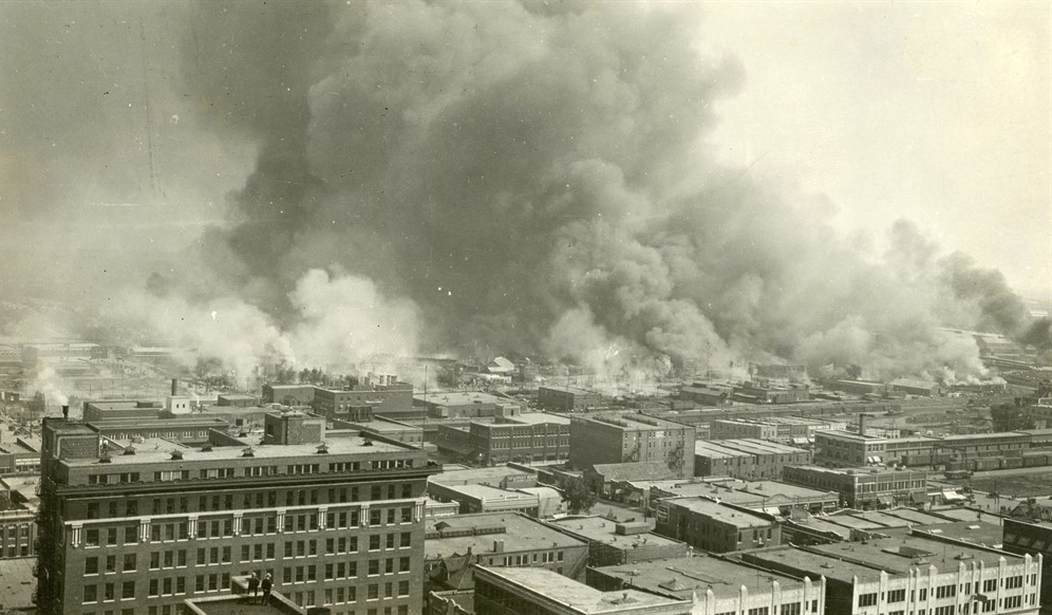The Tulsa Massacre of 1921 is generally considered one of the single worst acts of racist violence in US history. A prosperous area known as Black Wall Street was burned to the ground by an angry mob. It started with an interaction between a black man and a white woman on an elevator.
The massacre began during Memorial Day weekend after 19-year-old Dick Rowland, a black shoeshiner, was accused of assaulting Sarah Page, a white 21-year-old elevator operator in the nearby Drexel Building. He was arrested and rumors that he was to be lynched were spread throughout the city, where a white man named Roy Belton had been lynched the previous year. Upon hearing reports that a mob of hundreds of white men had gathered around the jail where Rowland was being held, a group of 75 black men, some armed, arrived at the jail to protect Rowland. The sheriff persuaded the group to leave the jail, assuring them that he had the situation under control.
The most widely reported and corroborated inciting incident occurred as the group of black men left when an elderly white man approached O. B. Mann, a black man, and demanded that he hand over his pistol. Mann refused, and the old man attempted to disarm him. A gunshot went off, and then, according to the sheriff's reports, "all hell broke loose." The two groups shot at each other until midnight when the group of black men were greatly outnumbered and forced to retreat to Greenwood. At the end of the exchange of gunfire, 12 people were dead, 10 white and 2 black.
As word spread, a larger mob of white people moved through the Greenwood neighborhood of Tulsa setting things on fire. The violence stopped the next day when the Oklahoma National Guard stepped in. Exact death tolls are unknown but estimates range from just under 40 to as many as 300. In addition several hundred people were injured and thousands of black residents of Greenwood were left homeless.
In 2020 three survivors of the event, who were young children at the time, filed a lawsuit seeking reparations from the state. Their case was dismissed by a lower court and they appealed to the state's Supreme Court. Today that court dismissed their lawsuit in an 8-1 decision.
The nine-member court upheld the decision made by a district court judge in Tulsa last year, ruling that the plaintiff’s grievances about the destruction of the Greenwood district, although legitimate, did not fall within the scope of the state’s public nuisance statute.
“Plaintiffs do not point to any physical injury to property in Greenwood rendering it uninhabitable that could be resolved by way of injunction or other civil remedy,” the court wrote in its decision. “Today we hold that relief is not possible under any set of facts that could be established consistent with plaintiff’s allegations.”...
The city and insurance companies never compensated victims for their losses, and the massacre ultimately resulted in racial and economic disparities that still exist today, the lawsuit argued. It sought a detailed accounting of the property and wealth lost or stolen in the massacre, the construction of a hospital in north Tulsa and the creation of a victims compensation fund, among other things.
Because the lawsuit was filed in state court, this decision is the end of the line.
The ruling concludes the lawsuit that Ms. Randle and Ms. Fletcher filed in 2020. Last year, another survivor of the massacre, Hughes Van Ellis, the younger brother of Ms. Fletcher, died at 102. Because the plaintiffs sued under state law and not federal law, they cannot appeal to the U.S. Supreme Court...
State and local officials have argued that while the massacre was horrific, they should not be held accountable for events that happened over two days in 1921.
The lawsuit, a rare effort to make the government accountable for the massacre, named the Tulsa County sheriff, county commissioners and the Oklahoma Military Department, which administers the Oklahoma Army and Air National Guard, as defendants.
I'm not an attorney but the argument being made by the plaintiffs seems like a stretch. The crimes in question weren't carried out by institutions but by people, all of whom are long gone. There's no doubt the victims of the massacre were denied justice during their lifetimes (no compensation was made for most of the destruction, even insurance claims were not paid), but they too are gone with the exception of the two survivors who were young children at the time.
I'm sympathetic to them as individuals, but the idea that people/citizens/taxpayers who weren't born at the time should be held accountable for the actions of people now dead strikes me as unfair as well. I'd be happy to see a fundraiser to benefit these two women as the last survivors of a terrible day in American history, but I don't think the law should obligate everyone to contribute.









Join the conversation as a VIP Member